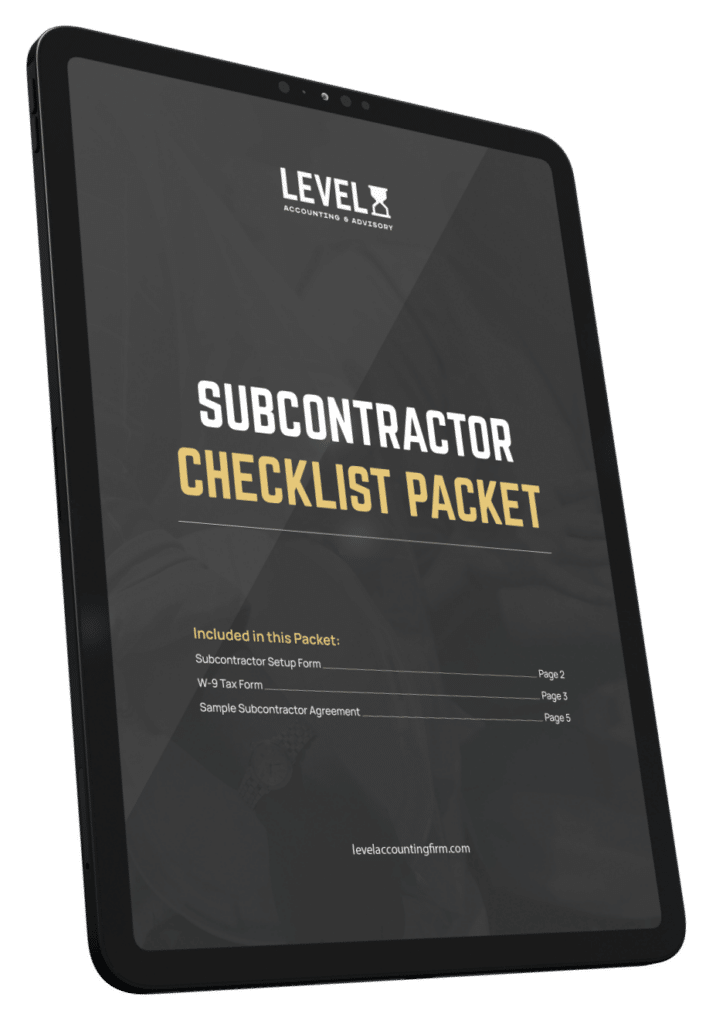Understanding Tax Deductions vs. Tax Credits: A Contractor’s Guide
5 min readUnderstanding the differences between tax deductions and tax credits can significantly impact your financial planning.
For contractors and business owners, understanding the difference between tax credits vs tax deductions is crucial for maximizing your tax benefits. While both reduce your tax burden, they work in fundamentally different ways. More importantly, having a dedicated business accounting firm that understands the construction industry can make all the difference in identifying and properly claiming these tax benefits.
The Power of Specialized Business Accounting Before diving into credits and deductions, it’s crucial to understand why working with a specialized business accounting firm matters. For contractors, tax planning isn’t just about annual returns – it’s about year-round strategy. A firm like Level Accounting & Advisory provides comprehensive services including monthly bookkeeping, which is essential for tracking job costs, equipment expenses, and labor costs accurately. This ongoing attention to detail ensures you’re not missing out on valuable deductions specific to the construction industry.

What is a Tax Credit?
A tax credit provides a dollar-for-dollar reduction of your tax liability. For contractors, this is particularly valuable. For example, if you owe $5,000 in taxes and qualify for a $2,000 tax credit, your tax bill drops directly to $3,000.

Tax credits come in two forms:
- Nonrefundable credits can reduce your tax liability to zero
- Refundable credits can both reduce your liability to zero and provide you with a refund for any remaining credit amount
For contractors, relevant credits might include:
- Work Opportunity Tax Credit for hiring eligible workers
- Energy-efficient construction credits
- Research and Development credits for innovative construction methods
What is a Tax Deduction?
Tax deductions reduce your taxable income, which in turn lowers your tax bill. For contractors, this is where having expert monthly bookkeeping becomes crucial. Level Accounting & Advisory helps contractors track and document essential deductions such as:

- Vehicle expenses for traveling between job sites
- Equipment depreciation
- Materials and supplies
- Home office deductions
- Professional insurance premiums
- Subcontractor payments
- Payroll
Real-World Example for Contractors Let’s say you’re a contractor in the 24% tax bracket and comparing a $10,000 credit versus a $10,000 deduction:
The $10,000 tax credit directly reduces your tax bill by $10,000. The $10,000 tax deduction reduces your taxable income, saving you $2,400 (24% of $10,000).
This illustrates why accurate tracking and categorization of expenses through professional bookkeeping is so vital – missing deductions means missing out on substantial tax savings.
Why Specialized Business Accounting Matters Level Accounting & Advisory offers contractors:
- Expert monthly bookkeeping to track all potential deductions
- Payroll services to handle employee and subcontractor payments
- Strategic tax planning to maximize benefits
- Comprehensive tax return preparation
- 1099 preparation and filing for subcontractors
- Industry-specific expertise in construction accounting
Most importantly, they understand the unique challenges contractors face, from job costing to equipment depreciation. Their comprehensive approach ensures you’re not just filing taxes, but strategically managing your business finances year-round.
Maximizing Your Tax Benefits Working with Level Accounting & Advisory means you’ll have experts who understand both the tax code and the construction industry. Their team can help you:
- Identify industry-specific deductions you might be missing
- Plan major equipment purchases for optimal tax benefit
- Structure your business for maximum tax advantage
- Maintain detailed records that support your deductions
- Stay compliant with tax laws while maximizing benefits
Don’t leave money on the table by trying to handle complex business taxes alone. Contact Level Accounting & Advisory to ensure you’re making the most of every available tax benefit while maintaining robust financial records that support your growing business.
Did this blog help you? Check out our other blogs below:
- 1099 vs W2: What Contractors Need to Know About Hiring
- BOI Reports: Your How To Guide to Filing
- Cash vs Accrual Accounting for Construction Businesses
- 1099s: Everything Contractors Need to Know
- Why Should Contractors Consider an S-Corp Election
- How to Pay Yourself as an S-Corp Owner
- 20 Tax Deductions for Contractors
- Cost of Small Business Accounting
- Section 179 Deduction: List of Tools & Vehicles that Qualify
- Write Off Your Vehicle For Taxes: How to Guide
- More can be found Here
Disclaimer: This article provides general information and should not be construed as tax, legal, or accounting advice. Always consult qualified professionals for guidance specific to your situation.


